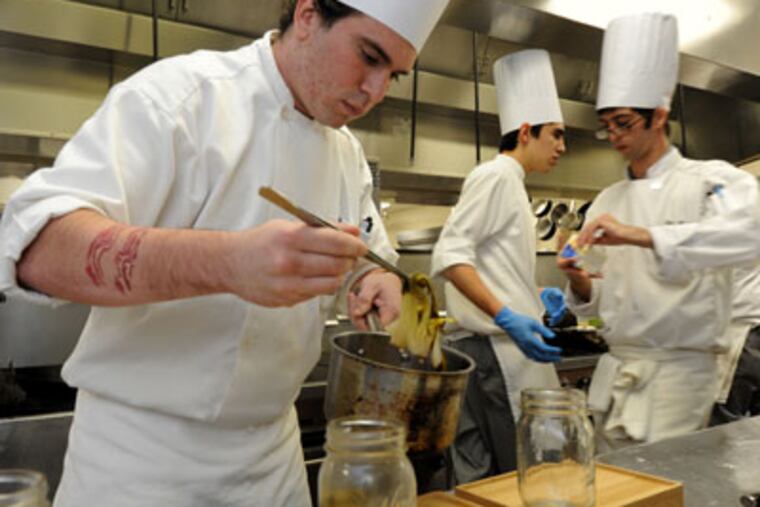N.J. culinary arts students compete for bragging rights
MAYS LANDING, N.J. — Lined up in clean chef's whites and paper toques, five teams competing Monday in Atlantic Cape Community College's Academy of Culinary Arts annual Student Iron Chef Competition — the school's version of the popular television show — were nearly breathless waiting to find out the secret ingredient. Would it be clams? Squid? Or scup, the decidedly unglamorous bottom-dwelling fish species known around here as porgie?

MAYS LANDING, N.J. - Lined up in clean chef's whites and paper toques, five teams competing Monday in Atlantic Cape Community College's Academy of Culinary Arts annual Student Iron Chef Competition - the school's version of the popular television show - were nearly breathless waiting to find out the secret ingredient.
Would it be clams? Squid? Or scup, the decidedly unglamorous bottom-dwelling fish species known around here as porgie?
Porgie it was.
And by the end of the six-hour exercise - in which the teams of five students each were judged on communication, presentation, and other skills - about 20 dishes had emerged from the kitchens, all featuring the firm, mild-flavored white fish. There were porgie tacos, porgie puffs, pork-fried rice porgie. Porgie was made into soup and served with pasta. It was stuffed, roasted, and pureed. Even a particularly alliterative dish featuring poached porgie with polenta made it into the competition.
It all put one in the mind of spam à la Benny Hill.
"This really gives the students a chance to work as a team, devise recipes, and execute them under the pressure of competition with that secret ingredient in each dish. And it's fun," said chef Vincent Tedeschi, an instructor who conceived of the student iron chef competition eight years ago.
Winners walk away with bragging rights and their names on an academy trophy.
Weeks before the contest was held, administrators told participants they would be working with clams, squid, or scup. With the secret ingredient still under wraps Monday morning, each team had time to strategize before the staggered competition began. Some went in armed with recipes that could be adapted to any of the species, while others tailored specific preparations for each seafood. Some teams used only ingredients provided by the school, while others created from-scratch components such as their pasta or sauces.
No one actually believed the secret ingredient would be the lowly scup/porgie. What chef puts scup on a menu? some wondered.
"It is one of the species that fisheries are now trying to promote," Tedeschi explained. "You may start seeing it more and more in restaurants under the name scup or sheepshead ... not porgie."
The competition fits in particularly well with the ACCC academy's mission to provide two-year associate degrees in culinary arts by broadening students' exposure to real-world situations, Tedeschi said. The culinary academy has operated as one of the college's centerpiece programs since 1981, providing a trained workforce for the state's casino and tourism industry.
Tedeschi designed a competition full of twists and turns. With only 15 minutes from the time contestants were told the secret ingredients until they could begin cooking, the heat was on. So judges could taste food while it was hot, teams cooked in staggered shifts, then had 90 minutes to produce a minimum of four dishes. They plated two of each of the recipes for judges to taste and one for a display.
Judges included two Avalon-based chefs, Steven Cozzi of Fuze Restaurant and Steven Serano of Cafe Loren, along with Gef Flimlin, a professor and marine extension agent for Rutgers Cooperative Extension Service.
"I dreamed about doing this from the first time I saw Iron Chef on TV. The adrenaline rush is incredible," Joe Mikitish, 23, of Cherry Hill, a first-year student and member of Team 2, said immediately after finishing the preparation. His team produced a porgie and chipotle dish with a maple glaze that the judges really seemed to like. "You really had to move, though, and work as a team."
Teams could earn a score as high as 50 points, with 10 points each given for flavor, knowledge of the item, presentation, originality, and sanitation. Up to 10 points could be taken away for infractions such as lateness or unsatisfactory cleanliness. While everybody apparently passed the white glove test, two of the teams lost 10 points each for coming in way past deadline, while two others each got small deductions for being a minute tardy. The judges said one team didn't adequately communicate with one another as they prepared their recipes, resulting in an "uneven" presentation of the dishes.
Another seemed to fail Cooking 101 by not tasting any of the food as they worked - and ultimately presented dishes that had little flavor, according to the judges.
In the end, minor tardiness didn't hurt Team 3, which earned a winning 40.3 points for its tempura-battered porgie taco with queso blanco made from scratch.
"I'm thrilled we won. I was a little surprised by the secret ingredient, but I thought the scup was interesting. It ended up being a surprisingly versatile fish," said Team 3 member Lou Solometo, 24, of Mullica Hill, who said his group came prepared for "no matter what was thrown" at them.
"I think it's the little touches that helped us win," he said.
Contact Jacqueline L. Urgo at 609-652-8382 or jurgo@phillynews.com.